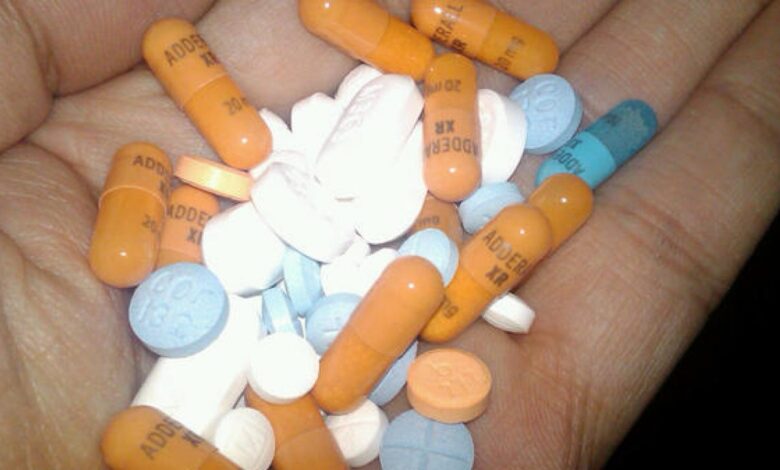Can I Take Expired Adderall?

Adderall contains a combination of amphetamine and dextroamphetamine. Amphetamine and dextroamphetamine are central nervous system stimulants that affect chemicals in the brain and nerves that contribute to hyperactivity and impulse control.
Adderall is used in the treatment of attention deficit hyperactivity disorder (ADHD) and narcolepsy. It is also used as an athletic performance enhancer, cognitive enhancer, appetite suppressant, and recreationally as an aphrodisiac and euphoriant. It is a central nervous system (CNS) stimulant of the phenethylamine class.
Adderall is considered a first-choice treatment option for ADHD. Studies show that it improves attention and focus, and reduces impulsive behaviors. Between 75 percent and 80 percent of children with ADHD will see improved symptoms with the use of stimulants such as Adderall.
Adderall is also effective for increasing daytime wakefulness in people with narcolepsy, although there is little related research available.
Adderall comes in two forms:
- Adderall oral tablet
- Adderall XR extended-release oral capsule.
How should I take Adderall?
Take Adderall exactly as prescribed by your doctor. Follow all directions on your prescription label. Your doctor may occasionally change your dose. Do not take this medicine in larger or smaller amounts or for longer than recommended.
Adderall may be habit-forming. Never share this medicine with another person, especially someone with a history of drug abuse or addiction. Keep the medication in a place where others cannot get to it. Selling or giving away this medicine is against the law.
Read all patient information, medication guides, and instruction sheets provided to you. Ask your doctor or pharmacist if you have any questions.
You may take Adderall with or without food, first thing in the morning. Do not crush, chew, break, or open an extended-release capsule. Swallow it whole.
To make swallowing easier, you may open the capsule and sprinkle the medicine into a spoonful of applesauce. Swallow right away without chewing. Do not save the mixture for later use.
While using this medicine, your doctor will need to check your progress at regular visits. Tell any doctor who treats you that you are using this medicine.
Adderall can cause unusual results with certain medical tests. Tell any doctor who treats you that you are using this medicine. Keep track of your medicine. Adderall is a drug of abuse and you should be aware if anyone is using your medicine improperly or without a prescription.
Does Adderall Expire?
Yes, Adderall can expire. An expiration date is a date after which a consumable product such as food or medicine should not be used because it may be spoiled, damaged, or ineffective. Expiration dates are especially important for medications because they offer the only indication about whether the product is still safe to use
In the late 1970s, the United States Food and Drug Administration (FDA) mandated that all prescription and over-the-counter (OTC) medical products contain an expiration date. Expiration dates for medicines are often marked “EXP” and are printed on the label or stamped onto the medicine bottle or box.
Can I take expired Adderall?
No, expired Adderall is less effective or risky due to a change in chemical composition or a decrease in strength. The expiration date is the final day that the manufacturer guarantees the full potency and safety of a medication. Drug expiration dates exist on most medication labels, including prescription, over-the-counter (OTC) and dietary (herbal) supplements. U.S. pharmaceutical manufacturers are required by law to place expiration dates on prescription products prior to marketing.
Certain expired medications are at risk of bacterial growth and a sub-potent Adderall can fail to treat attention deficit hyperactivity disorder (ADHD) and narcolepsy, leading to more serious illnesses. Once the expiration date has passed, there is no guarantee that the medicine will be safe and effective. If your Adderall has expired, do not use it. Even though some controversial studies indicate that some drugs can be used after expiry dates, it is better to err on the side of caution in order not to complicate your health condition or trigger unwanted adverse effects.
Common side effects of Adderall include:
• lack of appetite
• dry mouth
• trouble sleeping
• headache
• stomach pain
• constipation
• nausea
• weight loss
• anxiety
• dizziness.
These side effects may go away within a few days or a couple of weeks. If they’re more severe or don’t go away, talk to your doctor or pharmacist.
Expired Adderall may still interact with monoamine oxidase inhibitors (MAOIs), other over-the-counter medications. Before taking Adderall, be sure to tell your doctor and pharmacist about all prescription, over-the-counter, and other drugs you take. Also tell them about any vitamins, herbs, and supplements you use. Sharing this information can help you avoid potential interactions.
If you have questions about drug interactions that may affect you, ask your doctor or pharmacist.
Acid-reducing drugs
Medications that reduce the amount of acid in your stomach can increase the amount of Adderall your body absorbs. This can raise your risk of side effects. Examples of acid-reducing drugs include:
• antacids that contain calcium carbonate, aluminum hydroxide, magnesium hydroxide, or sodium bicarbonate (such as Gaviscon, Maalox, and Tums)
• H2 receptor blockers such as:
o cimetidine (Tagamet)
o famotidine (Pepcid)
o nizatidine (Axid)
• proton pump inhibitors such as:
o esomeprazole (Nexium)
o lansoprazole (Prevacid)
o omeprazole (Prilosec)
o pantoprazole (Protonix)
o rabeprazole (Aciphex)
Monoamine oxidase inhibitors (MAOIs)
Taking Adderall with MAOIs can increase the risk of dangerous side effects, such as very high blood pressure, chest pain, severe headache, and increased body temperature. Adderall shouldn’t be taken within 14 days of using an MAOI.
Examples of MAOIs include:
• isocarboxazid (Marplan)
• linezolid (Zyvox)
• phenelzine (Nardil)
• selegiline (Emsam, Eldepryl, Zelapar)
• tranylcypromine (Parnate)
Serotonergic drugs
Taking Adderall with medications that increase serotonin in your body can raise your risk of developing serotonin syndrome, a drug reaction that can be dangerous. If you take any of these medications, you may need to start with a lower dosage of Adderall.
Examples of medications that increase serotonin include:
• antidepressants, including:
o selective serotonin reuptake inhibitors (SSRIs) such as fluoxetine (Prozac), paroxetine (Paxil, Pexeva, Brisdelle), and sertraline (Zoloft)
o serotonin-norepinephrine reuptake inhibitors (SNRIs) such as duloxetine (Cymbalta), venlafaxine (Effexor), and desvenlafaxine (Khedezla, Pristiq)
o tricyclic antidepressants such as amitriptyline, desipramine (Norpramin), imipramine (Tofranil), and doxepin (Selinor).
o monoamine oxidase inhibitors (MAOIs) such as phenelzine (Nardil) and selegiline (Emsam, Eldepryl, Zelapar)
• certain opioids such as fentanyl (Fentora, Abstral, others) and tramadol (Ultram, Conzip)
• the anxiety medication buspirone (Buspar)
• lithium
Tricyclic antidepressants
Taking Adderall with a tricyclic antidepressant can increase the effects of Adderall in your body and increase your risk of heart-related effects and other side effects. Examples of tricyclic antidepressants include:
• amitriptyline
• desipramine (Norpramin)
• imipramine (Tofranil)
• nortriptyline (Pamelor)
• protriptyline (Vivactil)
Drug metabolism inhibitors
Taking Adderall with certain medications that block how the body breaks down Adderall can result in an increased risk of serious side effects, including serotonin syndrome. If you take these medications, you may need to start with a lower dosage of Adderall. Examples of these medications include:
• fluoxetine (Prozac)
• paroxetine (Paxil, Pexeva, Brisdelle)
• quinidine (Quinora)
• ritonavir (Norvir)
What to do with expired Adderall?
The CDC reports that 50,000 young children end up in emergency rooms each year because they got into medicines while an adult wasn’t looking. Expired medicines are also not just a risk to the person they were prescribed for and can injure children and pets if taken by mistake. For all these reasons, proper disposal of unneeded medicines is essential.
Keep this medication in the container it came in, tightly closed, and out of reach of children. Store it at room temperature and away from excess light, heat and moisture (not in the bathroom).
It is important to keep all medication out of sight and reach of children as many containers (such as weekly pill minders and those for eye drops, creams, patches, and inhalers) are not child-resistant and young children can open them easily. To protect young children from poisoning, always lock safety caps and immediately place the medication in a safe location – one that is up and away and out of their sight and reach. http://www.upandaway.org
Unneeded medications should be disposed of in special ways to ensure that pets, children, and other people cannot consume them. However, you should not flush this medication down the toilet. Instead, the best way to dispose of your medication is through a medicine take-back program. Talk to your pharmacist or contact your local garbage/recycling department to learn about take-back programs in your community. See the FDA’s Safe Disposal of Medicines website (http://goo.gl/c4Rm4p) for more information if you do not have access to a take-back program.
A place for everything
Proper storage is one way to help make sure your medicines will remain safe and effective up to their expiration date. Be sure to read the label to see if there are specific storage instructions for your medicine. Certain medicines need to be stored in the refrigerator and others cannot be exposed to high temperatures. Improper storage – such as a damp bathroom cabinet – can contribute to decreased effectiveness in medicines that have not reached their posted expiration date. For most medicines, to help ensure the proper shelf life of your medicine, it is better to store medicine in a cool, dry place such as a dresser drawer, storage box, closet shelf, or kitchen cabinet.
When storing medicine in a kitchen cabinet, make sure that it is away from hot appliances and the sink due to changing temperatures and humidity which can affect the medicine. When storing medicine in a high traffic area like a kitchen, care should be taken to prevent access by children at risk of accidental poisoning or others who may be tempted to take for abuse/misuse.
Remember to store medicines properly and don’t use expired medicines, it’s not worth the risk!





